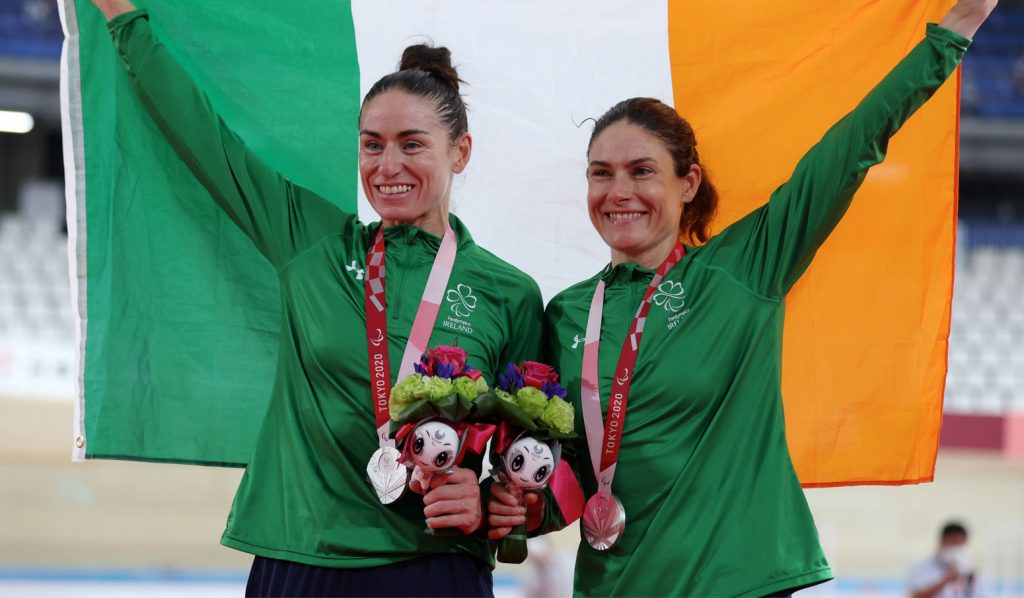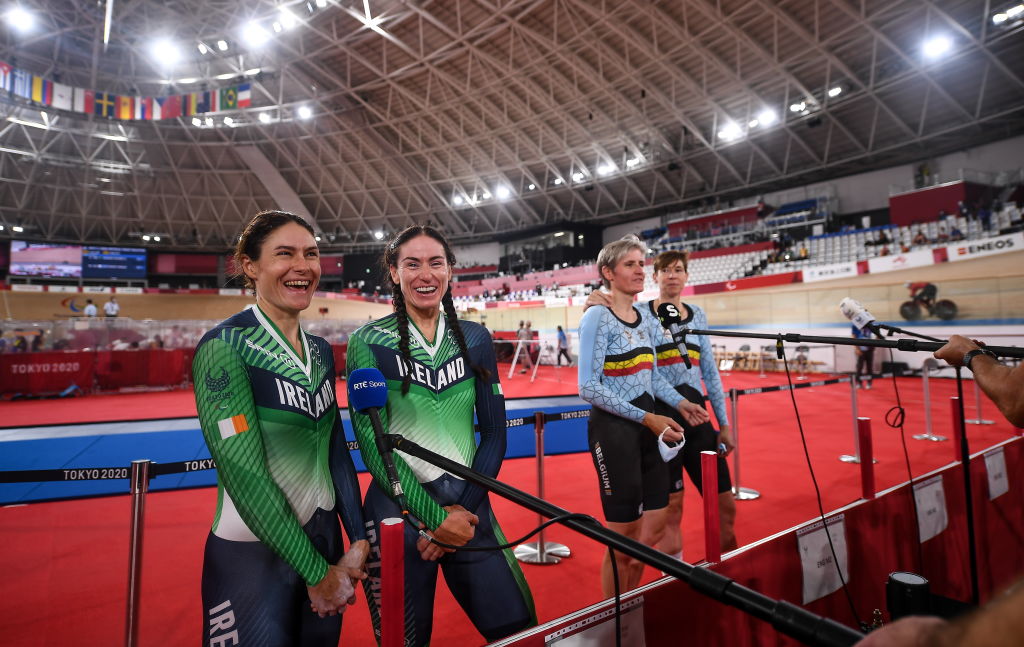Last week, the Irish Post sat down with Katie-George Dunlevy, one of Ireland's most successful Paralympic champions of the last decade.
Dunlevy has won many gold and silver medals at the Rio and Tokyo Paralympics in the blind tandem events, along with pilot Eve McCrystal.
Dunlevy has also had to overcome more than a few setbacks to achieve her goal of becoming a five-time Paralympic medallist for Ireland.
 Katie George Dunlevy, right, and pilot Eve McCrystal won silver in the Women’s B 3,000m Individual Pursuit (Image: Kiyoshi Ota/Getty Images) )
Katie George Dunlevy, right, and pilot Eve McCrystal won silver in the Women’s B 3,000m Individual Pursuit (Image: Kiyoshi Ota/Getty Images) )She was diagnosed with retinitis pigmentosa (RP) at 11. RP is a genetic disorder of the eyes that causes vision loss, making her achievements more remarkable.
Her journey to become a champion didn't start with cycling, though. She also dabbled in athletics, rowing and swimming before finding her calling in tandem cycling. the sport of para-cycling.
Katie gave an insight into her life, overcoming rejection, and the type of legacy she'd like to leave behind after it's all said and done.
Growing up in Ireland
Dunlevy was born on November 26, 1981, in Crawley, West Sussex, England. Katie was encouraged to play all sports from a young age. After receiving the diagnosis for RP, a school to help children with visual impairment soon followed for the future Paralympic champion.
Katie's father comes from a village and townland in the south of County Donegal called Mountcharles. Irish culture has had a huge influence on her, and she went into detail about her memories of visiting the country as a child.
"Ireland had a big influence on me growing" up, she said
"I spent all my summer holidays with my family in Donegal, staying at my father's family home in Mountcharles and my aunt's Nans B&B in Bundoran. I've got many fond and special memories that I remember to this day and go back to every year if I can.
"I can still remember playing in my grandmother's dressing room, sitting in her rocking chair by the fireplace, and the smell down the main street of turf being burned in the fireplaces.
"The long walks down the glen from Main Street to the ‘wee pier’ where we fished for crabs, swimming at the beach, and then at the ‘big pier’ where we jumped off the edge.
Dunleavy's Uncle and aunts, the McGinley’s in Faugher in Glencolmcille, also made her childhood special
"Our visits down to my dads Uncle and Aunties, the McGinley’s in Faugher in Glencolmcille, were equally memorable—climbing through the old ruins, exploring the many nooks and crannies and even taking in all the lyrical sounds of the Irish language.'
"In Bundoran, I thought the B&B was a maze and loved jumping off the rocks into the sea and playing the amusements with my cousins.
When you came from a large town, these pastimes and the beauty of the place were just heaven-like. They were such fun times.
Red lemonade and Club Orange were such a treat and made the visits all that more special."
 Tokyo , Japan, August 26, 2021; Katie-George Dunlevy, left, and Eve McCrystal of Ireland speak to RTÉ . (Photo By David Fitzgerald/Sportsfile via Getty Images) )
Tokyo , Japan, August 26, 2021; Katie-George Dunlevy, left, and Eve McCrystal of Ireland speak to RTÉ . (Photo By David Fitzgerald/Sportsfile via Getty Images) )Getting into sports from a young age
"I got into sports and competitions in a particular school in Kent, and the teacher spotted something in me—a talent or something.
"I was initially a day student, but after that, I stayed for the weeks and started getting increasingly involved into nationals and events for Team GB.'
"I was initially a day student, but after that, I stayed for the week, returning home at the weekends, and started getting increasingly involved in national events."
Soon after, Katie attended a school in Worcester that catered for students aged 11–19 who were blind or partially sighted.
As she took up swimming and athletic training, sports started to become more competitive for Katie.
She competed at a cross-country competition in Prague, a swimming competition in Barcelona and competed for team GB in the European Athletics Championships, winning a Bronze in the 400m senior women as a 17-year-old.
In 2004 and 2005, Katie won two gold medals at the Adaptive World Rowing Championship. One at Kaizu, Gifu, Japan and one in Banyoles, Spain, the year before.
Unfortunately, due to injuries, Katie lost her seat in 2006 and could never regain her seat in the boat to feature in the World Championships.
Katie tried every year since 2010 until a new calling and passion came.
"I got some injuries in 2006 and lost my seat for the World Championships.
"I trialled out every year until 2010 and was unsuccessful, and that's when I trialled out for the Para-rowing team in the hope of being selected for their World Championships in 2011. "
Katie didn't make the team but was persuaded by a para-cycling coach in 2011 if she would like to take part in para-cycling, and the rest is history.
When asked how she dealt with setback after setback, she said: "I moved to Maidenhead near the River Thames to practice my rowing. I was really determined at the time to carry on and make the Beijing Paralympics, even the London version in 2012."
"I got loads of knockbacks, but I turned up every year," she laughed.
"I was really driven and stubborn. I just wanted to see how successful I was and how far I got.
"It wasn't to be, but when cycling came around for me,. I remember going to Dublin and doing testing on the bike, and the coach said, "Oh, we want you and Louise to represent Ireland in six weeks at the World Championships."
'They told me I'd be fine despite never having ridden a bike, and I guess there's always a silver lining in the clouds."
Ireland's Katie-George Dunlevy & Eve McCrystal receiving their #GOLD at the #Paralympics.
Look at those smiles!🏅🇮🇪 pic.twitter.com/P9nxH9qx7w— JOE.ie (@JOEdotie) September 14, 2016
What winning medals for Ireland meant
Since then, Katie has taken tandem cycling in stride and won many accolades that many Irish sporting stars can dream of.
Two gold medals, silver at the 2020 Summer Paralympics, and gold and silver at the Rio Paralympics in 2016 are achievements that she could have only dreamt of when asked to cycle a bike for the first time in 2011.
These are just some of her most notable achievements, and it don't seem to scratch the surface when you google her Wikipedia page.
Katie admitted that she was immensely proud of her achievements after all the challenging work behind the scenes.
"I am immensely proud of what I have achieved and what I have had to do to get there because not everyone sees what goes on behind the scenes to get there," she said
"Everyone sees the medal, but nobody sees the hard work before it."
Adding on what it feels like to win a gold medal for your country, Katie could not explain the feeling but said that it's like nothing else she's ever experienced.
"It feels like nothing else. It's quite emotional. You can't explain it."
"There's no real feeling. It's emotional. When you hear the national anthem and you stand for the country, it's one of the memories that you never forget.
"I mean, I have small goals and aims, and you work towards them, and you can look forward to Paris down the line, but you don't think about that until you come closer to it, as I've got many World Championships I need to peak for before then.'
"But the ultimate goal is the Paralympics, and everyone is working towards that. I've got a great team around me, and we don’t leave any stone unturned coming up to the games.
"It’s all about preparation, putting in the hours when you need to, and working on the little things.'
"We knew when it came to Tokyo that we had done everything we could. When it does come to the day of the races, you have done everything you can and hope it’s enough, and thankfully, we did."
Happy St Patricks Day 🍀It’s always an honour to represent our amazing country on the International stage 🚴♀️🇮🇪 #StPatricksDay pic.twitter.com/LWOCl9nFNV
— Katie-George Dunlevy 🏳️🌈 (@KatieGDunlevy) March 17, 2022
Becoming the first Paralympians to win the team of the Year accolade at the RTE Sports Awards ahead of the likes of Leinster and Shamrock Rovers
Since then, Dunlevy and her riding partner Eve McCrystal became the first Paralympians to win the team of the Year accolade at the RTE Sports Awards last December.
The award is the Irish equivalent of the BBC Sports Personality Awards.
Dunlevy and McCrystal were up against Olympic rowing gold medallists Paul O'Donovan and Fintan McCarthy, the Leinster Rugby team, the Limerick hurlers, Meath ladies Gaelic football team, Shamrock Rovers, the Tyrone Gaelic footballers, the women's four rowers, and the Galway camogie team. They beat them all.
When asked what it meant at the time, Katie said: 'We have never won anything like that and as a parasport, it's never been recognised in Ireland.'
"It was massive and a huge step for paralympic sports in Ireland, and hopefully it's the first of many," she added.
"It was lovely, and we were shocked, to say the least."
Ireland's tandem para-cycling stars Katie George Dunlevy and Eve McCrystal have been named as the RTÉ Sport Team of the Year. pic.twitter.com/DZT58RRFfl
— RTÉ Sport (@RTEsport) December 18, 2021
What kind of legacy would she like to leave?
Adding on to what it meant for future athletes, Katie also said, "We are elite sportsmen and women, and Ireland does have many successful Paralympic athletes.
"But I also think that those who see the achievement can look up and see that those sports are for people with disabilities too.
"To know that you have a disability or not and that you can do sport at a level if you want to is the most important thing."
The next Paralympics will take place in Paris in 2024. When asked what's her next goal after completing the set, Katie said, 'we will see what happens.'
"It's hard to get one medal, but I am aiming high. It's so hard to get one, but we will see what happens."
Katie-George Dunlevy has overcome obstacles many people can only imagine in their dreams. Her stubbornness despite life's problems separates her from the rest, and it doesn't look like she's about to "call it a day anytime soon."
When asked what legacy she wants to leave behind after parking her bike in the garage, she ended the interview by saying,
"If someone had said to me back when I was rowing that I'd win five gold medals, I'd have laughed.
"It's a real blessing. I never expected it. It's amazing."
"But in terms of legacy, I'd like to leave it behind. I'd like the sport to move on and for someone to take my place when I do retire."
"But I also think that those who see the achievement can look up and see someone with disabilities achieving great things and that they can too.
Knowing that, if you have a disability or not, you can do sport at any level if you want to is an important thing.'
Despite any barriers or obstacles you have, you still can achieve great things and aim high.
You can follow Katie's journey on her social media by clicking on these:Twitter, Facebook, and Instagram links

